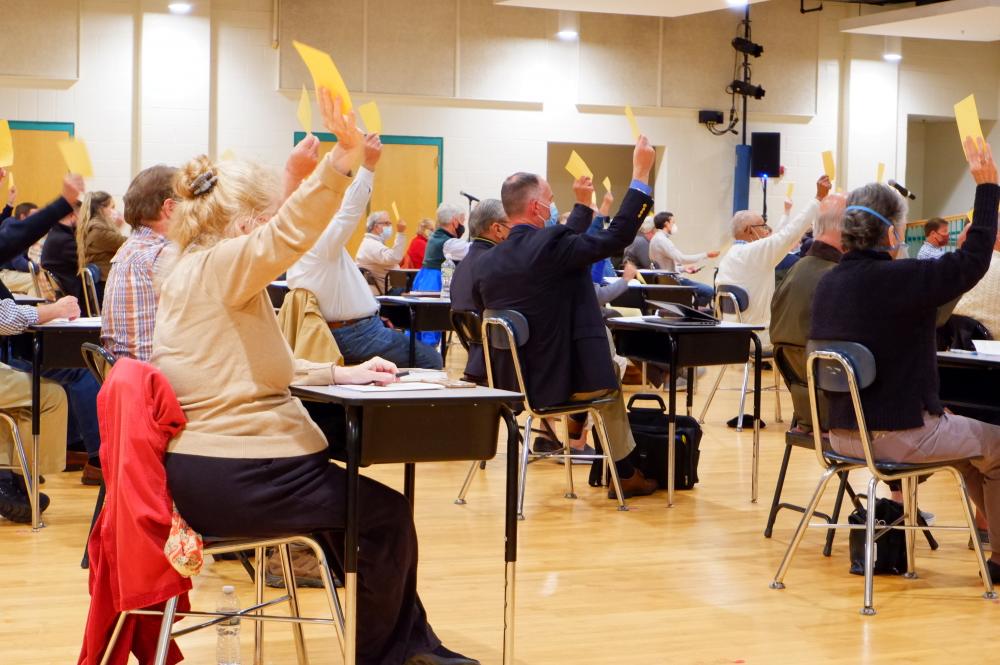OR agreement passes, other major measures fail at Marion Town Meeting
MARION — Long-delayed changes to the Old Rochester district agreement made it through Marion’s Special Town Meeting on Oct. 19, but other issues, including a littering bylaw and zoning change that would allow plans for a 48-unit development to move forward, met a worse fate.
Old Rochester agreement
Changes to the agreement governing Old Rochester Regional High School and Junior High, which are supposed to be made twice a decade, haven’t been made since 1986.
Some significant changes to the agreement include the creation of a capital stabilization fund that would help pay for routine maintenance and a change to the way the schools are funded that will make each town’s annual contribution more consistent.
The new agreement would also change the start and end dates of school committee terms to better line up with the school year.
But the issue of most contention for attendees of Town Meeting was a change in the agreement to comply with the state’s so-called “one man, one vote” policy. The change would make it so elected school committee members are divvied up among the towns on basis of population.
Some Marion residents took issue with the change, claiming that some years down the line, Mattapoisett and Rochester could hold a lion’s share of votes and stifle Marion’s voice on the ORR School Committee.
But, committee member and Marion resident Heather Burke noted, one man, one vote is a state policy, and its exclusion from the agreement would keep OR out of compliance with Massachusetts regulation.
The changes to the agreement have now passed at both Marion and Rochester’s Special Town Meetings, leaving Mattapoisett with last say on the matter at its November Special Town Meeting.
Litter bylaw
A litter bylaw that would create more stringent punishment for objects cast aside by those in town was shot down at Town Meeting, after a number of residents complained that the bylaw as it was written was ill-conceived.
Complaints largely involved the vague scope of the bylaw, which would broaden the amount of punishable littering actions, currently confined by state law to the casting garbage from out of a car window.
With no other littering laws, local or otherwise, on the books, the town has no recourse for such offenses.
But concerns about the bylaw’s implications regarding property rights — it would leave the responsibility of monitoring litter up to property owners — drowned out sentiment in favor of the bylaw, and it was strongly defeated in a vote that required a two-thirds majority to pass.
Zoning change
A planned 48-unit development at 78 Wareham Road, adjacent to the forthcoming Heron Cove project, needed a two-thirds majority vote on a zoning change in order to build housing of its proposed density.
That proposition was shot down in a near-50-50 vote after residents expressed broad concerns, from water and sewer infrastructure needs to traffic to general distaste for the project.
While approval of the zoning would have technically allowed up to 12 units per acre on the property, developers have already signed and submitted a deed restriction, which would cap potential building at 48 units — just under two per acre.
Still, concerns including its placement near the Marion-Wareham line on Route 6 and the project’s lack of official commitment to becoming a 55-and-up community — the development is only targeted to those over 55 looking to downsize, not restrictive of who may purchase a unit — caused the measure to fail.
Other articles
All other articles that came before Town Meeting passed. Measures included: Appropriation of funds to continue Town House renovations and create detailed plans for a new Harbormaster’s facility; changes to the terms of the moderator and tree warden positions; clarifications for solar array, zoning board and dog licensing bylaws; the dissolution of the Council on Aging board; and changing the Water Supply Protection District to the Water Supply and Aquifer Protection District.
















